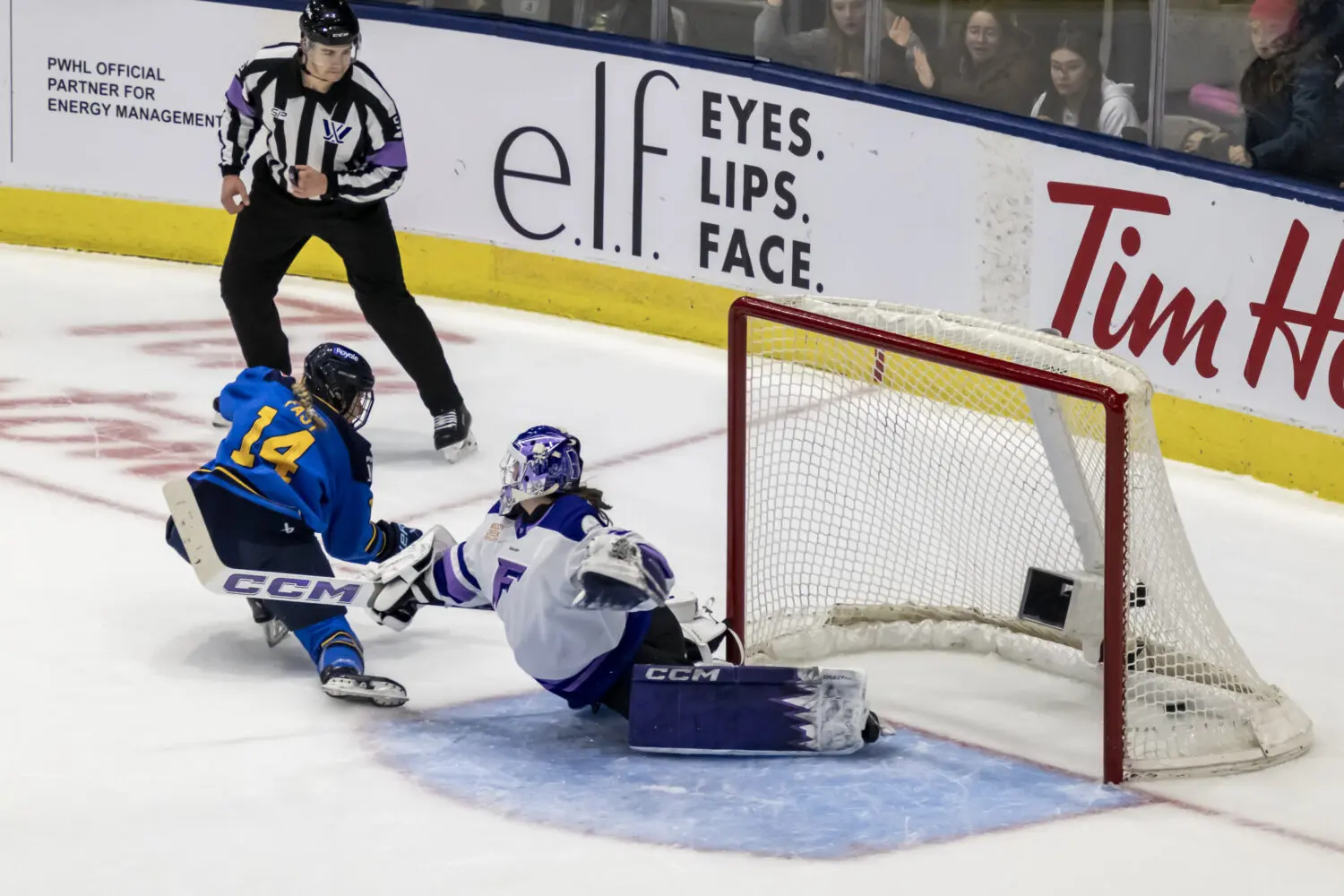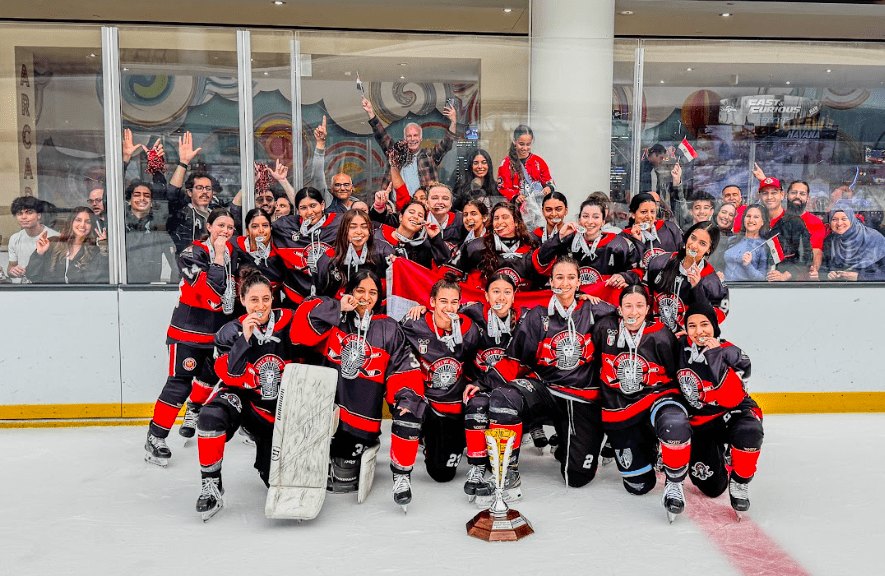The pride of New Glasgow, Nova Scotia, Kori Cheverie is part of a groundbreaking yet simultaneously exciting chapter for women in sport. As Canadian Interuniversity Sport prepares for an upcoming season of ice hockey, Cheverie has already made an incredible impression, contributing a great feeling of anticipation and excitement.
Having been appointed to the coaching staff as a full-time assistant coach of the Ryerson Rams men’s ice hockey team, Cheverie becomes the first woman in CIS hockey history to take on such a role. She joins a new-look coaching staff that includes Johnny Duco as interim head coach, inheriting the position from newly retired Graham Wise, who won 92 games with the Rams. Joining them on the staff includes former Oshawa Generals player Nathaniel Brooks, along with student athletic therapists Jason Lee and Marlon Tejada.
“I am looking forward to working with the (Ryerson) university team. I am very excited for this opportunity. It reminds me of my experiences (as a player) with the St. Mary’s Huskies, (especially) being on the ice with the team every day.”
The Rams open their season on home ice at the Mattamy Athletic Centre (inside Maple Leaf Garden) on September 13, as they host the Western Mustangs. Cheverie is part of a team that has posted back-to-back winning seasons, along with double digit wins in five of the last six seasons, complemented by four straight playoff berths.
Undoubtedly, Cheverie’s role only builds on the incredible momentum that exists with women in coaching, joining an impressive sorority filled with notable names. The National Football League features another woman occupying a role similar to Cheverie as Kathryn Smith is taking on the role of special teams and quality control for the Buffalo Bills, the league’s first full-time female assistant coach. Last season, Sarah Thomas became the first full-time female official in NFL history (although Shannon Eastin was the first woman to officiate an NFL game back in 2012), while Dr. Jen Welter taking on a coaching internship with the Arizona Cardinals. This season, Liz Sowers is taking on a similar role with the Atlanta Falcons.
A pair of women made a remarkable mark in 2015 in Major League Baseball. Former softball superstar Amanda Hopkins was hired by the Seattle Mariners as a scout, while the Oakland Athletics made Justine Siegal an instructor for their instructional league team in Arizona. She was also the first woman to throw batting practice for a major league team, doing so with the Tampa Bay Rays. Such empowering achievements were evident in 2016, as Jessica Mendoza became the first woman to serve in the broadcast booth for ESPN’s coverage of MLB baseball while Summer Games gold medalist Jennie Finch served as the manager of the Bridgeport Bluefish, becoming the first woman to manage at any level.
In discussing the pioneering role of women in sports, Cheverie brought up two other names that have made an impression on her. Among them is Dawn Braid, who was hired by the NHL’s Phoenix Coyotes as a skating coach, believed to be the first female full-time coach in NHL history. Taking into account that both Cheverie and Braid were both hired in August 2016, there is a serendipitious empowerment. In addition, Cheverie also mentioned Becky Hammon, the first woman to serve as a full-time assistant coach among the four major sports.
“I think it is amazing how it is now starting in hockey. I really look up to Becky (Hammon) with the NBA’s San Antonio Spurs. She has done great things. The Coyotes recently named a female full-time skating coach to their team. It is all going in the right direction. It is good to see big organizations believing in equal opportunity for both men and women.”
Upon hearing the news, it represented a tremendous milestone in Cheverie’s highly accomplished career, one that has involved a superlative playing career with the St. Mary’s Huskies of Atlantic University Sport (where she graduated third all-time in program scoring) and six sensational seasons with the Toronto Furies, highlighted by a Clarkson Cup win in 2014. Reputed for her assiduousness, empathy, willingness to learn (which was evidenced by earning CIS Academic All-Canadian honors) and solid work ethic, it came as no surprise that Cheverie was already hard at work when she received such details,
“It was pretty exciting. I was in New Zealand when I got the news. I was helping their national team with their international process, it was a good experience.”
While Cheverie carved an exceptional playing career, her commitment to the game is one that has seen her assemble a similar career as a coach. Having begun coaching while she still played with the St. Mary’s Huskies (working with youngsters), she would later balance playing for the Furies with a role as a Skate Training Specialist for Ryerson, working with the Rams hockey teams on mechanics while committed to improving overall skills.
Adding to this growing legacy is the fact that Cheverie has also brought her knowledge to other parts of the world, including Beijing and Shanghai, China (where she claimed the gold medal with Team Canada in women’s ice hockey at the 2009 Winter Universiade) and New Zealand, which featured player Renata Bastos compete in CIS hockey for the last couple of seasons with the York Lions. Cheverie’s overseas efforts have proven to be a labor of love, transforming her into an ambassador for the game,
“I am very fortunate. My biggest message is to stick with it. Hockey can bring you around the world, literally. It can be a vehicle. I have had the opportunity to experience different countries. China and New Zealand are two very different places. There are not too many players in each country as it is an expensive sport. China had its language barrier. New Zealand had a lack of proper training at a young age, but they are keen to get the program up to Canadian standards. They need to get more players. Both were different experiences.”
While the China experience took place in 2014, the opportunity to visit New Zealand in August 2016 also involved another prominent member of both the Ryerson athletic community and the women’s hockey community. Vanessa Stratton, a former player with the Brock Badgers, whose body of work as a world-class referee includes the inaugural CWHL All-Star Game, plus provincial, national and international women’s ice hockey events, she is also a member of Ryerson’s Skate Training staff.
Stratton, who is also working alongside Cheverie as members of the Scarborough Sharks AA coaching staff this year, took part in an international goodwill exchange program, spending a memorable two weeks with New Zealand national women’s team. Stops in Christchurch, Gore, Queenstown and Tekapo are an extension of the mutual respect between the two, both collaborating in a remarkable effort to extend the game’s global reach,
“We both kind of have different approaches to the game. In the past three years (at Ryerson), we have gotten to know each other and we complement each other really well with what we bring to the game and the things that we are familiar with. We have traveled before to other camps. She brings on the refereeing side of the game while I am more focused with puck control and puck protection, the systematics of the game.”
This newest chapter in her hockey career sadly represented the closure of another chapter. Retiring from the Toronto Furies, she does so with no regrets. In addition to a Clarkson Cup title, Cheverie holds three records with the club, including most points, games played and power play goals. As a side note, she is also the CWHL’s all-time record holder for most consecutive games played, strengthening her status as one of the Furies legendary players.
Having also played for head coach Sommer West for the last four seasons, Cheverie definitely found a positive coaching influence. Considering that the Furies were like a second family to her, she emphasizes that she does not want to end her association with this remarkable group. Through it all, Cheverie reflects on her decision to hang up her Furies jersey with a profound maturity, testament to her strong leadership skills and the devotion that she brings to any team, making her a highly respected presence.
“It was a tough decision not to play any more. It is never the right time to stop, there was never an optimal opportunity. I love my position of coaching as much as I do playing. I will miss the Furies terribly but I would like to help with the skill development side of it. My role with the team is not completely finished although the playing side of it is.”
As the season to come sees Cheverie take on coaching with an even more determined demeanor, admirably balancing coaching roles with both the Sharks (as the head coach) and Rams, her passion is destined to shine. Discussing how her growth as a player and a shift in focus represented a new approach towards coaching, Cheverie proves that making adjustments and recognizing a need to continue learning are essential components towards strong leadership, elements that have always made her a positive influence at the rink,
“I enjoy coaching. When I was first coaching in 2007-08 (in Nova Scotia), I was still playing (at St. Mary’s) and I wanted to do everything for the players, sharing my knowledge and seeing what they could do.
Now, more of my focus is on learning. I love to watch the game and see new things. With coaching, I get a lot of rewards from my players being able to improve in a game. I love to teach, I love to talk. I feel like I have been that student of the game for so long.
I felt that I was the best player I was (during my career) in my last years with the Furies compared to five years at St. Mary’s.
Just to see what it takes (to coach), especially at the university level, there is a lot more that goes into it. We are constantly developing the whole athlete. They are involved in academics first and athletics second. They also have to balance their social life. Many are away from home for the first time, and it can be an uncomfortable position.
To see the players every day, it is different from minor hockey. It is definitely going to be a big challenge, working at this high level. What intrigued me is that it is very competitive, I love a challenge and I am excited to see what we can accomplish with a young staff.”
“All quotes obtained first hand unless otherwise indicated”
Photo credit: Alex D’Addese
[adrotate group=”1″]
Related Articles
Categories
Recent Posts
[adrotate group=”2″]




